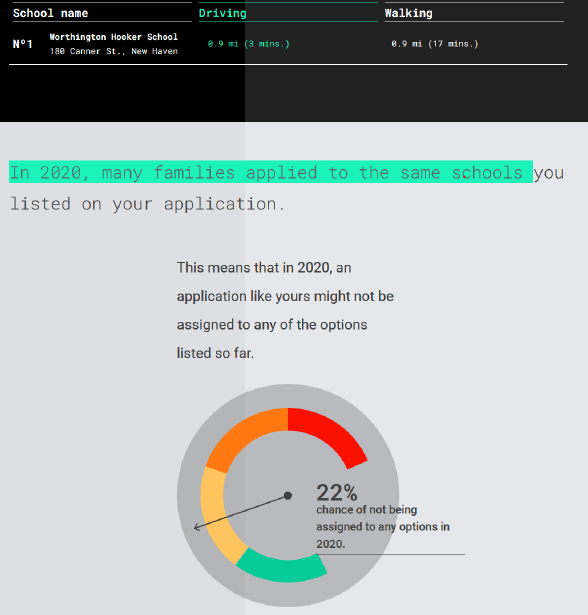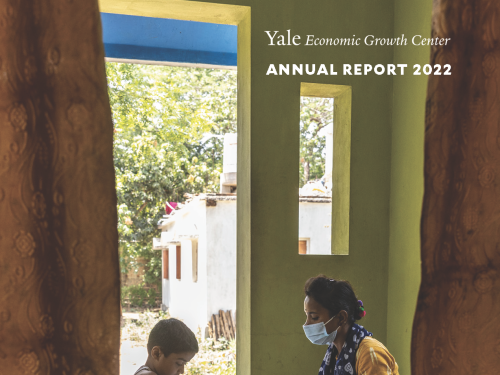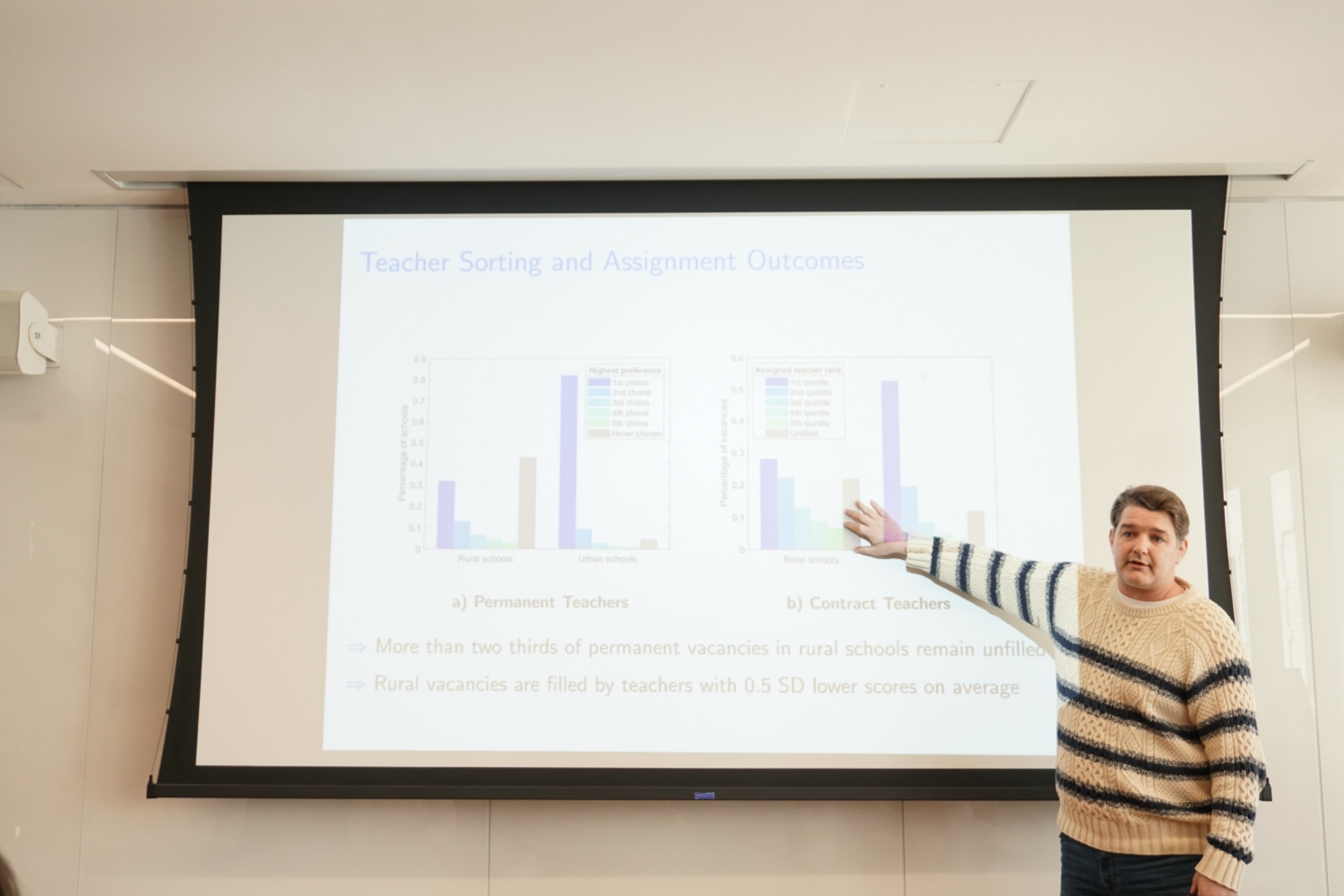CLAIS Affiliate Faculty Christopher Neilson on Addressing Inequalities in Educational Markets with the Power of Personalized Information

CLAIS fellow David Alzate (Jackson School)has written this article on CLAIS faculty affiliate Christopher Neilson (Department of Economics.) It has been originally published at the EGC site. Due to its relevance to CLAIS, we reproduce it here with their permission.
Educational inequalities – in terms of access, delivery, and quality as well as outcomes – are a major challenge for school systems in countries across the income spectrum. To understand what drives educational inequalities, it is helpful to see education as a “marketplace”. While some parents might pay to send their children to private schools, most students attend heavily subsidized or free public schools.
Attending either a private or public school is not a process that happens automatically. To enter this “marketplace”, students and parents must make a series of individual choices: whether to attend school at all, whether to attend private or public school, and then which schools to apply to – resulting in a complicated system that is often difficult to understand and navigate, for families and administrators alike. Especially when schooling is free for all, governments typically rely on digital platforms to match students to schools, running complex algorithms that nonetheless may continue to perpetuate inequalities.
Christopher Neilson – a recently appointed Professor of Economics and Global Affairs at Yale’s Department of Economics and Jackson School of Global Affairs, as well as a new EGC affiliate – uses research to design practical tools for promoting more equitable opportunities in educational markets. Most recently, in a paper published in the Quarterly Journal of Economics, Neilson and coauthors analyzed the impacts of providing personalized information to students and their families about their education-related prospects during the school application process. Using cutting-edge digital platforms that leverage artificial intelligence and big data, the researchers found that providing such information reduced dropout rates and improved educational outcomes.
Going beyond academic research, Neilson and his organization ConsiliumBots also actively work with governments–from Latin America and the Caribbean to here in New Haven – to help implement and test data-driven education innovations. Combining rigorous analysis with policy impact, Neilson’s work illustrates the powerful potential of applying economics insights to real-world challenges.
The value of personalized information about schooling options
Neilson’s first encounter with educational inequalities was during his time as a Yale PhD student in economics, trying to secure a spot for his child in New Haven’s public school system. Standing next to other parents who were in-the-know – mainly other Yale graduate students and professors – he spent an entire night outside waiting in a line to maximize the chances of securing a spot in a good school. The experience reminded him of his own childhood, when his mother would try to enroll him in school on the first day of classes only to be turned away because they had not registered in advance. Suddenly, he and his child were on the other side of that informational divide – but Neilson’s reaction to both instances was the same.
“Everyone who passes through these systems often says the same thing: ‘This is nuts, this makes no sense!’” Neilson said in an EGC interview. “The schools might be amazing, but how can the application process be so dysfunctional?”– Christopher Neilson
For his PhD dissertation, Neilson decided to study how to make educational markets more efficient. His research focused on the effects of an education reform in Chile that essentially made all education free, including at private schools. After the reform, any student was able to apply to any school–thereby changing the “market dynamics” of Chile’s entire education system.
 An example of the ConsiliumBots digital matching platform.
An example of the ConsiliumBots digital matching platform.
The government launched a digital application platform, and Neilson advised Chilean officials on ways to test different market design algorithms to match students with schools given their preferences. However, during a pilot study in Punta Arenas, a mid-sized city near the southern tip of South America, Neilson and his partners in the Chilean government found that students were applying to too few schools, thereby limiting their chances of getting in anywhere. They realized that students and their families might not have understood the new platform well, or might not have thought carefully about the expanded schooling options when applying.
A new idea dawned on Neilson: to send students and their families personalized information about the particular educational possibilities available to them. Perhaps if they knew more about all the options on the table, families might make better educational choices.
The EGC Annual Report 2022
Read about EGC’s reach and impact, meet new members of the EGC community, and explore the research our faculty affiliates published during the 2021-22 Academic Year.

When a little advice goes a long way
After completing his PhD in 2014, Neilson continued his research as an assistant professor of economics at Princeton. He also continued to partner with governments and school across continents. In 2018, he founded the organization ConsiliumBots – whose name derives from the Latin word for “giving advice” – to support governments in designing, building, and implementing school choice and admission systems. While Chile is a high-income country, Neilson and his organization have implemented projects in countries across the income spectrum, including Brazil, Colombia, the Dominican Republic, Ecuador, and Peru. Neilson has also worked with cities in Europe and the United States – including a long-running collaboration with the New Haven school system that initially sparked his interest in these topics.
The recent Quarterly Journal of Economics paper illustrates how far Neilson has come since the initial pilot in Punta Arenas. Rather than a static application platform, Neilson and his coauthors helped design a dynamic school application process that provided students with personalized real-time feedback. Using survey and administrative data about the applicants’ demographics and past school performance, the researchers could identify who was at high risk of being rejected by the schools they selected. These were students who typically might end up not enrolling in any school because they overestimated their admissions chances while using the government’s platform.
Neilson delivering a Cowles Lecture at the Yale Department of Economics on “Teacher Compensation and Structural Inequality”, a paper exploring how increasing teacher compensation at hard-to-staff schools can reduce inequality in the access to high-quality teachers.
The study’s innovation was relatively simple: these high-risk applicants received a warning message (or two warning messages, for a randomly selected subset) via email or directly in the platform, notifying them that they were applying to schools where they had a low probability of being admitted. This modified platform was rolled out in two highly distinct contexts: at the national level in Chile, for both primary and secondary school admissions, and across the entire New Haven school district.
The results were remarkable: across Chile and New Haven, providing customized feedback had a dramatic effect on student enrollment. After being warned that their school choices were overly optimistic, 22% and 14% of the high-risk applicants in Chile and New Haven respectively responded by adding more schools to their choice list. This resulted in a 58% and 42% decrease in the risk of non-placement for these students. In addition to increasing overall enrollment, the high-risk students also ended up attending higher-quality schools – as measured by higher test scores, teacher salaries, and the schools’ fee structures.
Neilson has also experimented with different types of feedback mechanisms. In prior studies in the Dominican Republic and Peru, he tested the effectiveness of different messaging tools to convey the benefits of education: from telenovela-style videos to interactive tablets to classroom posters and discussions. Each messaging tool conveyed information about how career prospects – and potential earnings – improved at higher levels of education. Through a randomized controlled trial that varied which messaging tools were seen by different groups of students, Neilson and coauthors found they had a significant impact on students’ educational plans and reduced overall dropout rates. Following their successful implementation and evaluation, the programs were scaled by the Dominican and Peruvian governments to reach all public schools in the countries, reaching around 2 million and 7 million children respectively.
Increasing equity through information
 Neilson delivering a Cowles Lecture at the Yale Department of Economics. His research found that increasing salaries at less desirable public schools attracts better quality applicants and improves subsequent student test scores.
Neilson delivering a Cowles Lecture at the Yale Department of Economics. His research found that increasing salaries at less desirable public schools attracts better quality applicants and improves subsequent student test scores.
These results demonstrate that providing personalized information to students and their families is a promising tool for governments transparency and effectiveness when designing school choice and admission systems – which can have profound effects on educational equity. In particular, the low cost and scalability of these tools makes them attractive to governments facing competing budget priorities like Peru and the Dominican Republic.
Nonetheless, there is ample room for more research and innovation. According to Neilson, leveraging big data and artificial intelligence to tailor what information and advice is provided represents “a really interesting opportunity for governments to level up the way they interact with citizens”, especially in developing countries. Additional research can also shed light on the potential limitations and biases embedded within these predictive and informational tools.
Neilson returned to Yale last year after seven years at Princeton. He will continue to conduct research and pursue policy collaborations in the education sphere, both locally and around the world. Through ConsiliumBots, he plans to test complementary interventions that provide families with more tailored and continuous information, allowing governments to design systems that improve opportunities for all students.
